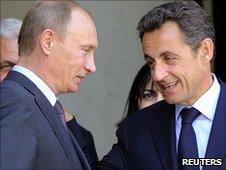Russia backs away from Iran missile deal
- Published

Mr Putin held talks with President Sarkozy at the Elysee Palace
Russian Prime Minister Vladimir Putin has said Moscow will freeze the sale of surface-to-air missiles to Iran, according to French officials.
Mr Putin made the comments in talks with French President Nicolas Sarkozy in Paris, the officials said.
In an apparent change of direction by Moscow, Russia's foreign minister said President Dmitry Medvedev will decree which weapons cannot be sold to Iran.
Sergey Lavrov earlier said the missiles were not subject to fresh UN sanctions.
Russia agreed to supply Iran with S-300 systems several years ago but has not delivered them.
Mr Lavrov said on Thursday that a fourth round of sanctions imposed by the UN Security Council this week would not affect Russia's contract to supply Iran with the missiles.
But on Friday he said: "According to our practice, the UN Security Council resolution is implemented through decrees issued by the Russian president. A decree to this effect will be prepared."
Correspondents say a flurry of statements by officials on Friday suggest Moscow is changing tack on the missile deal.
Iran 'unhappy'
President Sarkozy's office said on Friday Mr Putin had confirmed Russia would shelve the delivery.
A spokesman for Mr Sarkozy quoted the Russian leader as saying Iran was "very unhappy" and wanted to impose penalties on Moscow.
Mr Sarkozy praised the Russian leadership for supporting the sanctions during a meeting with Mr Putin at the Elysee place.
"It is an extremely courageous measure that will cost Russia a lot," he told Mr Putin, according to the spokesman.
Military experts say the S-300 systems could enhance Iran's defence of its nuclear facilities against attack from the air.
The White House acknowledged on Thursday that the latest sanctions did not explicitly ban the S-300 sale to Iran, but it welcomed Russia's "restraint" in not delivering them.
"Russia has exercised responsibility, restraint and has not delivered those missiles to Iran," state department spokesman Philip Crowley said.
Iran insists its nuclear enrichment programme is for peaceful purposes, but a number of Western countries suspect it of trying to build nuclear weapons.
The UN Security Council voted by 12 votes to two in favour of fresh sanctions on Wednesday. Brazil and Turkey voted against, while Lebanon abstained.
Iranian President Mahmoud Ahmadinejad has denounced the new UN resolutions saying they were like a "used handkerchief which should be thrown in the dustbin. They are not capable of hurting Iranians".
Mr Lavrov said on Thursday that Moscow is discussing building nuclear reactors in Iran in addition to the Bushehr site, due to open in August after years of delay.
- Published11 June 2010
- Published9 June 2010
- Published9 June 2010